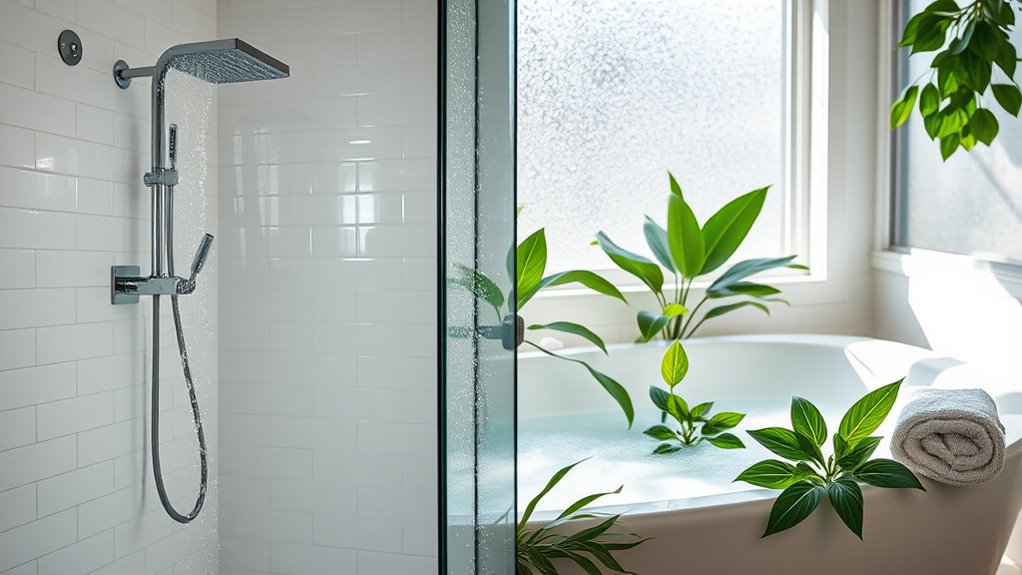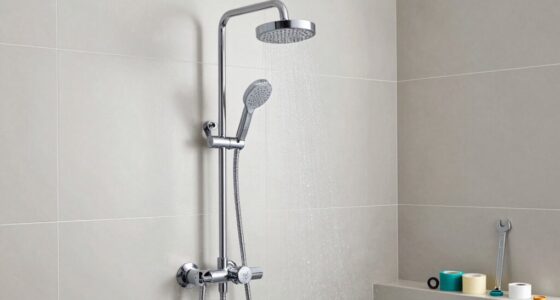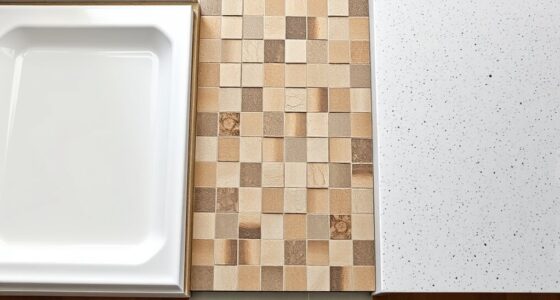If you’re choosing between a shower and a bath, consider your health and environment. Showers are quick and use less water—around 2-3 gallons per minute—making them more eco-friendly and suitable for daily routines. Baths, while relaxing, require more water—up to 50 gallons—and may not be as sustainable, though they offer muscle relief and self-care benefits. To make an informed choice and improve your habits, explore ways to maximize your comfort and conserve resources.
Key Takeaways
- Showers use significantly less water than baths, making them more eco-friendly and conserving resources.
- Quick showers effectively cleanse without soaking, supporting better hygiene with less time and water.
- Baths promote relaxation and muscle recovery but typically consume more water and energy.
- Using water-saving fixtures in showers reduces environmental impact while maintaining hygiene standards.
- Choosing between shower and bath depends on personal health needs, lifestyle, and sustainability priorities.
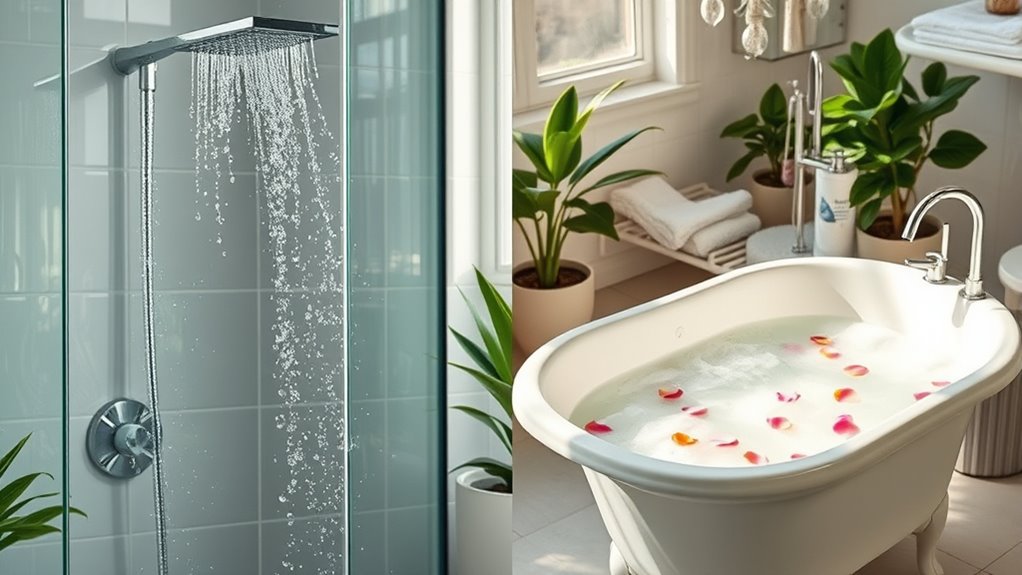
When choosing between a shower and a bath, your decision often depends on your lifestyle, space, and personal preferences. If you’re concerned about water conservation, a quick shower usually uses less water than filling a bathtub, making it a more eco-friendly option. Showers typically consume around 2 to 3 gallons of water per minute, so a five-minute shower can use about 10 to 15 gallons. In contrast, a standard bath can require 30 to 50 gallons of water, depending on the tub size. This significant difference means that opting for a shower can help you reduce your water footprint, which is especially important if you’re trying to minimize your environmental impact. On the other hand, baths can be more relaxing and might encourage better hygiene practices if you soak in warm water, allowing your body to thoroughly cleanse and relax muscles. Sometimes, a bath can be more effective at removing dirt and oils, especially when combined with bath salts or cleansers.
Your hygiene practices also play a crucial role in choosing between the two. Showers are quick and efficient, making them ideal for daily routines and busy schedules. They allow you to rinse off sweat, dirt, and bacteria rapidly, which can help maintain good hygiene with less effort. Baths, however, may be better suited for occasional use, especially if you need to relax sore muscles or soothe skin conditions. Incorporating baths into your hygiene routine might encourage you to take more time for self-care, but keep in mind that longer baths could lead to increased water usage unless you limit the fill level. To balance hygiene with water conservation, you can use a low-flow showerhead, which reduces water use during showers, or take shorter baths when you prefer a soak.
Ultimately, your choice should align with your values and daily habits. If you’re aiming to save water and reduce environmental impact, a short, efficient shower is typically the better choice. If you prioritize relaxation and thorough cleansing, a bath might suit you better, provided you’re mindful of water use. Consider pairing your routine with water-saving fixtures and mindful habits to optimize both hygiene and ecological responsibility. Whether you choose a shower or a bath, incorporating conscious water use and effective hygiene practices will help you maintain your health and support sustainability efforts.

Earth Showerhead – Niagara Conservation | Energy & Water Saving Showerhead (1.75 GPM) High-Efficiency 3-Spray Chrome Fixed Shower Head (N2917CH)
1. 75 GALLONS PER MINUTE – This water-saving shower head has a flow rate of 1. 75 gallons…
As an affiliate, we earn on qualifying purchases.
As an affiliate, we earn on qualifying purchases.
Frequently Asked Questions
How Do Showers and Baths Impact Indoor Air Quality?
You might not realize it, but showers and baths can affect your indoor air quality. Showers release steam and moisture into the air, which can decrease ventilation efficiency if not properly vented, leading to mold or mildew. Baths, especially hot ones, also produce humidity that can linger. To keep air quality high, guarantee good ventilation and use exhaust fans. Proper ventilation helps maintain a healthy environment and prevents moisture buildup.
Can Choosing Between Shower and Bath Affect Mental Health Benefits?
Choosing between a shower and a bath can influence your mental health, especially regarding stress relief and mental clarity. A bath allows you to unwind with warm water, promoting relaxation and reducing anxiety. On the other hand, a quick shower can refresh your mind and boost alertness. Your choice impacts how effectively you can de-stress and achieve mental clarity, making it a personal decision based on your mental health needs.
What Are the Long-Term Cost Differences Between Showers and Baths?
You might not realize it now, but your choice impacts your wallet long-term. The cost comparison between showers and baths isn’t just about water bills—think maintenance expenses too. Showers generally cost less over time due to lower water use and fewer cleaning needs. Baths, however, often involve higher water consumption and more frequent upkeep. So, consider your habits carefully, because these small differences add up and shape your expenses for years.
How Do Water Heater Types Influence Environmental Impact?
You should consider how water heater types influence environmental impact by looking at water heater efficiency and renewable energy options. High-efficiency models use less energy, reducing your carbon footprint, while solar or heat pump water heaters harness renewable energy, making them even greener choices. Choosing an efficient water heater helps lower emissions and saves you money long-term, making your daily routines more environmentally friendly.
Are There Health Risks Associated With Prolonged Bath Soaking?
Soaking in a bath for too long can pose health risks like skin irritation, as prolonged exposure to water can strip natural oils. You also risk microbial growth in the tub if it isn’t cleaned properly, which could lead to infections. To stay safe, limit your bath time, keep your tub clean, and dry off thoroughly afterward. This helps protect your skin and reduces microbial-related health issues.

Cleansing Sage Moon Milk Bath Soak – Lavender Chamomile – Moisturize & Soften Skin Spiritual Stress Relief Gifts for Women Destress Luxury Spa Bath Salt Powder Birthday Perfect Stocking Stuffers
Moon Milk Bath – New Miuz's luxurious coconut moon milk bath soak nourishes and hydrates skin for younger,…
As an affiliate, we earn on qualifying purchases.
As an affiliate, we earn on qualifying purchases.
Conclusion
Ultimately, whether you choose a shower or a bath, you’re steering your health and environment like a skilled captain steering a vast ocean. A shower’s brisk spray energizes your day like a swift breeze, while a bath’s gentle embrace soothes your soul like a warm sunset. Both hold their treasures—vitality and sustainability—waiting for you to uncover. So, weigh your needs, and let your choice be the compass guiding your well-being and the world’s future.

Aqua Elegante 3 Inch High Pressure Shower Head – Best Pressure Boosting, Wall Mount, Bathroom Showerhead For Low Flow Showers, 2.5 GPM – Chrome
💦 UNLIKE OTHER SHOWER HEADS THAT are made from cheap, thin plastic that leaks after a few showers,…
As an affiliate, we earn on qualifying purchases.
As an affiliate, we earn on qualifying purchases.
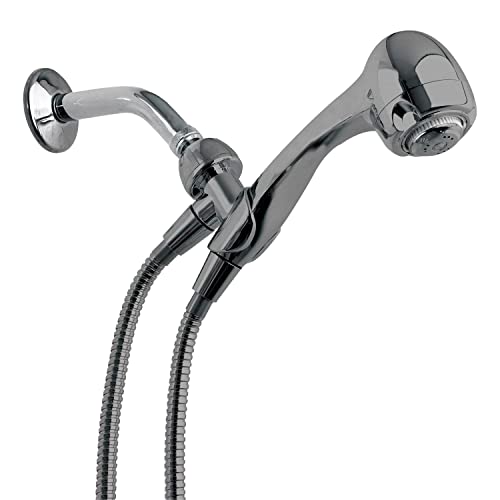
Niagara Conservation Luxurious, Water-Efficient Showerhead, Earth Massage Spa with 3 Spray Settings, Brushed Nickel Finish, 1.5 GPM (N2945BN)
1. 5 GALLONS PER MINUTE – This water-saving handheld shower head has a flow rate of 1. 5…
As an affiliate, we earn on qualifying purchases.
As an affiliate, we earn on qualifying purchases.
